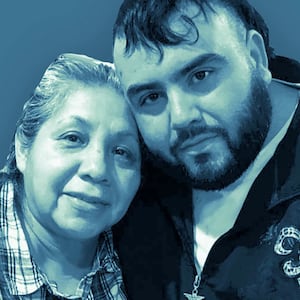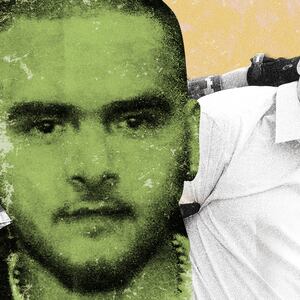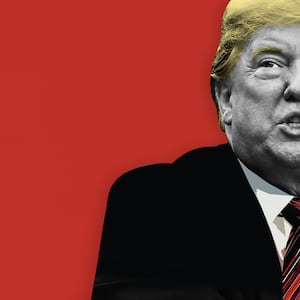For eight weeks, a jury in Brooklyn federal court has been listening to witnesses recount how Joaquin “El Chapo” Guzman moved tons of cocaine and heroin from Mexico to the United States, almost none of it—if any at all—across an unsecured stretch of border.
The makings of tens of thousands of overdoses was not backpacked across the desert by undocumented aliens. Much of it was smuggled by licensed drivers in vehicles through official points of entry, hidden in jalapeno pepper cans or frozen seafood or hidden compartments or wherever else might elude the searchers and their canines.
El Chapo also brought drugs in via trains and ships and submarines, none of which would be hampered by a wall. And he did not use tunnels just to break out of a Mexican prison. He constructed more than 100 that ran under border barriers, often from a warehouse in Mexico to one in the U.S., in an industrial area where trucks could come and go without drawing particular attention.
As a result, El Chapo was able to smuggle drugs in quantities that astonished his Colombian suppliers. He became as big as his ability to move product. A measure of that is contained in a 2012 exchange of texts that the feds recovered between him and Agustina Cabanillas Acosta, with whom he seems have mixed business with pleasure.
“How are the sales going?” El Chapo inquired.
“Oh, like busy bees,” she replied. “Nonstop, my love.”
The feds also recorded a conversation between El Chapo and Peter Flores, who, with his twin brother Margarito, became the biggest drug dealer in Chicago. El Chapo appears to have been able to supply any demand.
El Chapo: How much can you get rid of in a month?
Peter: Around 40 [kilos of heroin.]
El Chapo: Oh, that’s good… All right, I’ll send it then.
For El Chapo to have smuggled drugs in across an unsecured border would have meant being impossibly conspicuous in a desolate and deserted area. A truck at a point of entry is just one of thousands crossing there that day.
And, as a result of a longtime shortage of customs agents, an average of just 18 percent of the millions of vehicles arriving at the southern border points each year are searched by customs agents made bleary from working 16-hour days.
A president who was serious about stopping the drugs from coming across the border would have held a press briefing with Customs agents and emphasized the need for more of them—and for better supporting those we have.
But Customs agents work secured crossings. And to say there is an urgent need for more of them would be to admit that most of the drugs are coming in through points of entry, and would be unaffected by even the highest of walls.
Trump instead appeared with the head of the Border Patrol union. The Border Patrol largely works the unsecured stretches which our president tell us are in such urgent need of a wall that he is willing to shut down the government indefinitely until Congress funds it.
In the fourth paragraph of the Address to the Nation on the Crisis at the Border that Trump delivered from the Oval Office on Tuesday, he said this:
“Our southern border is a pipeline for vast quantities of illegal drugs, including meth, heroin, cocaine, and fentanyl. Every week, 300 of our citizens are killed by heroin alone, 90 percent of which floods across from our southern border.”
Trump failed to note that well over 80 percent of the illegal drugs—and even more of the heroin, cocaine and fentanyl—arrive through official points of entry. El Chapo would have had cause for a good chuckle had he chanced to watch the address with a translator handy at the federal lock-up in Manhattan.
El Chapo had moved at least 200 tons of drugs across supposedly secured stretches of the border. And here was Trump saying that more than anything we need to build a wall in the desert.
El Chapo, meet El Chumpo.
On Wednesday morning, El Chapo was once again escorted across the Brooklyn Bridge to the courthouse by a contingent of U.S. marshals, who are not being paid due to the shutdown. The marshals include several who were flown in from out of town, among them one from California with a meticulously groomed full beard and tattoos. He seems to be a particularly gracious lawman and you have to fret what he is doing about his hotel bill and meals without a per diem as well as without a paycheck.
El Chapo had no cause at all to chuckle when the feds presented to the jury phone calls and texts between him and his mistress as well as his wife. The snippets that caught the public’s attention included him asking his wife to replace the moustache dye he lost while fleeing the law and him joking about buying an AK-47 for one of their twin daughters, who were then a year old.
But the line that should have grabbed everybody, the one that translates to an actual emergency that really does claim hundreds of lives daily, was his mistress’s reply when he asked how the drug sales were going.
Others have since taken over the operation, but they are almost certainly still “like busy bees… nonstop.” Overdoses in the making are still pouring in.
Meanwhile, homicides are up 40 per cent in Washington, D.C., where Trump gave his big speech about the supposed border crisis. Nobody is suggesting that undocumented aliens are a significant factor in our capital’s murder rate. Our president therefore has not mentioned the carnage even as it rages in the streets of the city where he now lives and works and addresses the nation.








